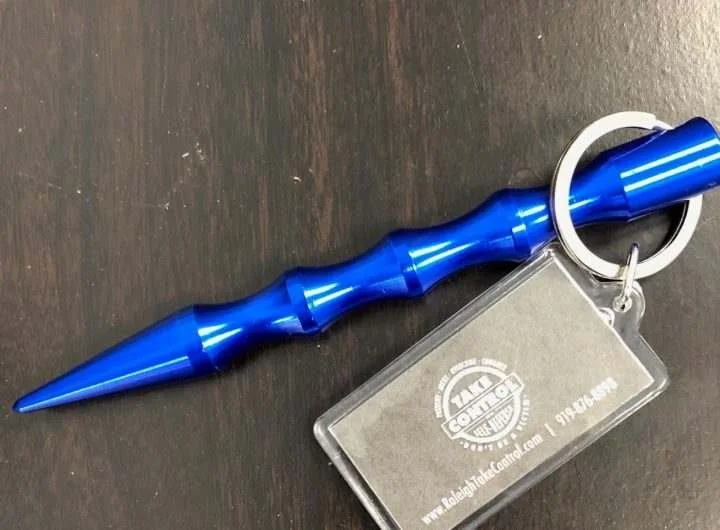Choosing the Right Self-Defense Tool for You
One of my favorite classes to teach and topics to discuss is about how to choose the right self-defense tool or weapon and how to use it. There is no one tool that is right for everyone in every situation. The key is to find one that works with your life style and plays to your natural strengths in how you defend yourself. Below are several questions to ask yourself when looking at possible self-defense weapons:
Is it legal? Based on where you live and work, laws are different in regards to what you can carry and use for self-defense.
Are you willing to use it? Do not carry anything you are afraid to use or don’t feel you can use against someone when you are being threatened. It will not do you any good and could lead to that weapon being used against you.
How will it affect you mentally, emotionally, physically, and legally after you use it?
How easily can it be used against you?
Where will you carry it? Make sure you have easy access to it and carry it in the same place all the time. An attacker will not wait for you to dig through your bag or figure out where you put it.
Will you be able to use it safely and confidently without endangering yourself or innocent bystanders?
How reliable is it? Make sure you take care of it so it is ready to work when you need it.
How often are you able to practice with it? Whatever you choose, make sure you continually practice with it so you will be able to use it effectively and efficiently.
If you choose to carry a deadly weapon, do you know any other forms of self-defense? If you carry a gun and know no other forms of self-defense, deadly force becomes your only answer to every situation. Deadly force is not always the right answer to every situation, nor is it always legal. Be sure to study the laws in your state and learn other ways to defend yourself so it is not your ONLY option.
PROs and CONs to a few popular self-defense tools:
Mace/Pepper Spray – While this is very popular for women and very easy to find, it does have a few draw backs. 1) If you use it on a windy day you may end up spraying yourself. 2) Many people carry this in their bag where it is hard to reach. 3) Because this is not something you can continually quality check and practice with, you don’t have the confidence that comes with training and that it will work properly.
Stick – Learning to use a stick has many benefits. 1) It’s very universal. Everything you do with a stick can be done with everyday items like a cane or umbrella. 2) It helps you create distance. You can hit someone with a stick before they can reach you. 3) Also, a stick won't feel any pain so you can hit as hard as you can without fear of injuring yourself. 4) One drawback is it may be easier to be used against you if you don’t have a strong enough grip or feel confident using it. But don’t let that deter you, most stick techniques are very quick to learn and effective.
Kubotan – This is one of my personal favorites. 1) It is easy to carry in your hand, ready to use. 2) With training, you can learn a variety of ways to use it including attacking nerves, grip breaking, and very effective striking. 3) It is harder for someone to take it away from you and use against you. 4) It’s incredibly universal in that the same techniques can be used with items like a pen, pencil, scissors, your cell phone, etc. 5) The only drawback is that you are not allowed to carry it in court houses, on planes, or in California. However, as stated earlier, it is very universal and you can take a pen or pencil with you almost anywhere.
Screamers/Whistles – Anything that makes a loud noise like a whistle can be beneficial by understanding its limitation and using it in conjunction with other great habits or self-defense tools. While a loud noise cannot physically block an attack, if it is used in the attacker’s face or next to the ear, it could startle them for a brief moment allowing you to get away or use another item to attack back. The loud noise could attract someone else’s attention, but do not only rely completely on that possibility. Chances are not high enough that someone would be close enough to hear AND be someone who would act appropriately by calling 911 to get you the help you need. Self-defense is about you learning how to defend yourself, not relying on the chance someone might be there to help. However, if you feel you are unable to protect yourself from an attacker by fighting back with something like a stick or a kubotan, then a screamer or whistle is a decent 2ndoption. Try to use it to distract the attacker AND bring attention to yourself.
You don’t have to have the latest, most popular, or deadliest weapon on you to defend yourself. If you are uncomfortable carrying an actual self-defense weapon, look at the items you do usually keep on you and learn how to use them.
Whatever you choose to defend yourself with, whether it is a traditional weapon or not, make sure you practice with it so it will actually work for you when you need it most.
